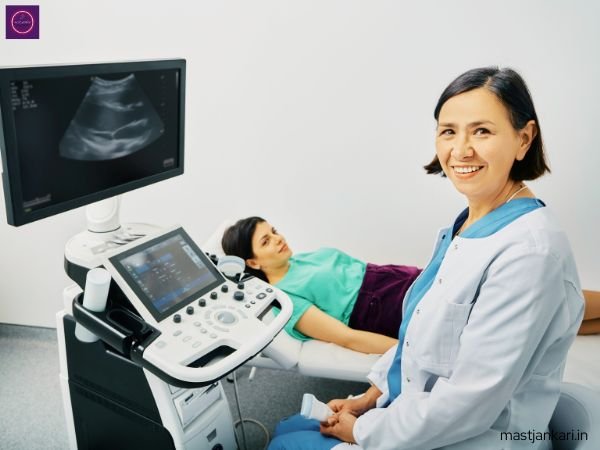Key Points:
Introduction
Can Follicular Study Confirm Pregnancy: The follicular study, also known as follicle tracking or ovarian monitoring. This procedure involves monitoring the growth and development of follicles in the ovaries.

What is invalid pregnancy test in pregnancy
follicular study is primarily used to track ovulation and assist in fertility treatments. The study of follicles is also useful for pregnancy confirmation. In this article, we will explore the role of follicular studies in confirming pregnancy.
Understanding Follicular Study
Before we talk about how Can Follicular Study Confirm Pregnancy, we first need to know what the process is. A follicle study uses ultrasound pictures to watch how follicles in the ovaries grow. The ovaries have follicles that hold eggs and let them out during ovulation. When doctors look at the ultrasounds, they see how big the follicles are and how many there are. This lets them know the best time for trying to get pregnant or starting treatments for fertility.
What is the color doppler test in pregnancy
In a follicle study, doctors use ultrasound pictures to look at the ovaries a few times, starting when a woman’s period begins. These pictures show which follicle in the ovary might release an egg when it’s time. When this main follicle grows big enough, the woman may release an egg in the next 1 or 1 and a half days.
Wondering when you need follicular monitoring?
It’s a painless procedure where small plastic probes are used to check how the follicles (where eggs develop) in your ovaries are doing. Here are some simple reasons to consider follicular monitoring:
- Trying to Get Pregnant and Under 35:
- If you’re under 35 and trying to get pregnant for about a year, this is the first step to check for any ovulation-related issues.
- Over 35 and Not Pregnant in 6 Months:
- If you’re over 35 and haven’t been able to get pregnant in the last six months, it’s a good time to consider follicular monitoring.
- Dealing with PCOD:
- If you have PCOD, your cycles might be irregular, and ovulation might not happen regularly. Follicular monitoring can help understand and manage this.
- Using Fertility Drugs:
- If you’re using fertility drugs for ovulation or undergoing procedures like IUI or IVF to produce multiple follicles, follicular monitoring becomes important.
Your doctor or sonographer might suggest having these scans around days 6 or 7 of your cycle, assuming you have a 28-day cycle. They’ll guide you, usually asking for scans every two to three days. It’s a helpful way to keep track of your fertility journey.
The Role of Follicular Study
Doctors use a follicular study to see when a woman ovulates. It can also show if a woman is pregnant. After a woman ovulates, the ovary creates a thing called the corpus luteum. This makes progesterone. Progesterone gets the womb ready for a baby and keeps the baby growing if the woman gets pregnant.
Doctors check the corpus luteum to see if someone is pregnant. In a study, they look at its size and how it looks. If it gets bigger and changes, it can mean there is a pregnancy. This is helpful for couples trying to have a baby. They can learn about pregnancy early, even before using home tests.
Accuracy and Limitations
A follicular study can tell us useful things about Can Follicular Study Confirm Pregnancy? but it’s not 100% sure. Just because there is a growing corpus luteum, it does not mean a woman is pregnant for sure. Sometimes, these can form even if she is not pregnant. Also, if there isn’t a growing corpus luteum, it doesn’t always mean she isn’t pregnant. In some women, the corpus luteum might grow slowly or not very strong.
Why do doctors “folliculometry,”
Well, it’s like taking pictures inside a woman’s belly several times during her monthly cycle (usually between days 9-20). These pictures help the doctors see when a special thing called a follicle bursts and lets out an egg. There are many reasons why these pictures, or scans, are helpful:
- Checking Follicles that Don’t Grow:
- Sometimes, the little homes where eggs live (follicles) don’t grow like they should. These scans help find them.
- Finding Follicles that Don’t Grow at All:
- Some homes for eggs don’t grow at all, and the scans are like detectives that find them.
- Looking for Dominant Follicles that Don’t Burst:
- There are special big homes for eggs, and sometimes they don’t burst open. Scans help see if they need some help.
- Checking the Bed for the Egg (Endometrial Lining):
- The place where the egg can snuggle in might not be good enough. The scans check if it’s just right.
- Guessing When the Egg Comes Out:
- These scans can guess when the egg is ready to come out, which is helpful if someone needs extra help to get pregnant.
- Helping with Special Medicines:
- If someone needs special medicines to help the egg, the scans guide the doctors on when and how much.
- Checking for Troubles:
- The scans also help find any troubles that might happen, like OHSS. Doctors want to catch these problems early.
- Finding Luteal Phase Deficiency:
- Sometimes, there’s a problem after the egg comes out. The scans help catch that too.
Doctors and special experts watch over these scans carefully. If they see anything not quite right, they can fix it quickly to help families who want to have babies.
Case Studies and Statistics
The ovaries special scan helps to find out if a woman is pregnant. An article in a science magazine talked about women’s health. It said that if you take a picture of a woman’s ovary and see something growing, there’s an 87% chance she is pregnant. Also, it is 92% certain it won’t say a woman is pregnant when she is not. This means that scanning the ovary is a good way to check for pregnancy, but we still need more tests to be done.
In a different study in related to Can Follicular Study Confirm Pregnancy? a science magazine about human reproduction, researchers looked at two ways of checking for pregnancy. They looked at the follicular study, which is a medical check, and home pregnancy tests that you can use yourself. They saw that the follicular study was right 95% of the time, but home pregnancy tests were right 85% of the time.
This means that the medical check (follicular study) may tell you if you are pregnant earlier and more accurately than the tests you take at home.
Conclusion
In the article about Can Follicular Study Confirm Pregnancy? we read that Doctors use follicular study often to check on ovulation and to help with fertility treatments. The follicles shows if a woman might be pregnant by looking at the corpus luteum. But follicular studies alone can’t prove that there is a pregnancy. It should be combined with other ways to check for pregnancy.
FAQ related to Can Follicular Study Confirm Pregnancy
Source:
Disclaimer
we are not Doctor or Health adviser. we make no warranties or representations and disclaim all responsibility and liability for the completeness, accuracy, or reliability of the above mentioned content. The content on our platform is for informative purposes only, and may not cover all clinical/non-clinical aspects.






